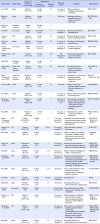Studies selected for the analysis
1. Koo MH. The effects of emotion coaching program on emotional regulation and parenting efficacy of mothers with elementary school child [master's thesis]. [Jeonju]: Chonbuk National University; 2018. 49 p.
2. Beak SS, Ahn YK, Kwak KH. The effect of emotional coaching parent education program on parenting efficacy, parenting attitude, and emotional expressiveness. Korean Journal of Child Education and Care. 2017;17(2):1-24. https://doi.org/10.21213/kjcec.2017.17.2.1
3. Beak SS, Kwak KH, Ahn YK. Change of mothers' emotional reaction attitude to their children in the emotion-coaching parents education program. Early Childhood Education Research & Review. 2017;21(3):289-313.
4. Lee JE. The Influence of parenting support program based on emotion-coaching on attachment and parenting attitude of mother [master's thesis]. [Seoul]: Chongshin University; 2017. 68 p.
5. Loop L, Mouton B, Stievenart M, Roskam I. One or many? Which and how many parenting variables should be targeted in interventions to reduce children's externalizing behavior? Behaviour Research and Therapy. 2017;92:11-23. https://doi.org/10.1016/j.brat.2017.01.015
6. Choi KH, Hong SO. The effects of an emotion-coaching parent education program on the psychological well-being and parenting- stress of mothers of children with developmental disorders. Journal of Korean Coaching Research. 2016;9(3):53-76.
7. Chronis-Tuscano A, Lewis-Morrarty E, Woods KE, O'Brien KA, Mazursky-Horowitz H, Thomas SR. Parent-child interaction therapy with emotion coaching for preschoolers with attention- deficit/hyperactivity disorder. Cognitive and Behavioral Practice. 2016;23(1):62-78. https://doi.org/10.1016/j.cbpra.2014.11.001
8. Dunsmore JC, Booker JA, Ollendick TH, Greene RW. Emotion socialization in the context of risk and psychopathology: maternal emotion coaching predicts better treatment outcomes for emotionally labile children with oppositional defiant disorder. Social Development. 2016;25(1):8-26. https://doi.org/10.1111/sode.12109
9. Han JY. Empirical study on mother's emotional reaction attitudes observed in application process of emotion-coaching parents education [master's thesis]. [Seoul]: Dongguk University; 2016. 119 p.
10. Lafrance RA, Dolhanty J, Stillar A, Henderson K, Mayman S. Emotion-focused family therapy for eating disorders across the lifespan: a pilot study of a 2-day transdiagnostic intervention for parents. Clinical Psychology & Psychotherapy. 2016; 23(1):14-23. https://doi.org/10.1002/cpp.1933
11. Porzig-Drummond R, Stevenson RJ, Stevenson C. A preliminary evaluation of the 1-2-3 magic parenting program in an Australian community services setting. Australian Social Work. 2016;69(4):388-402. https://doi.org/10.1080/0312407X.2015.1086010
12. Yu IS, Kim MH. Effectiveness of an emotion coaching parent education program using picture books. Journal of Children's Literature and Education. 2016;17(2):21-44.
13. Choi OM. The effect of Gottman's emotion-coaching parent education: on mother's child-rearing attitude and parenting stress [master's thesis]. [Seoul]: Duksung Women's University; 2015. 94 p.
14. Havighurst SS, Kehoe CE, Harley AE. Tuning in to teens: improving parental responses to anger and reducing youth externalizing behavior problems. Journal of Adolescence. 2015; 42:148-158. https://doi.org/10.1016/j.adolescence.2015.04.005
15. Park ES. Effectiveness of emotion coaching parenting education program: focused on parenting stress and conflict coping skills, self-esteem [master's thesis]. [Seoul]: Yongmoon University; 2015. 61 p.
16. Porzig-Drummond R, Stevenson RJ, Stevenson C. The 1-2-3 magic parenting program and its effect on child problem behaviors and dysfunctional parenting: a randomized controlled trial. Behaviour Research and Therapy. 2014;58:52-64. https://doi.org/10.1016/j.brat.2014.05.004
17. Salmon K, Dittman C, Sanders M, Burson R, Hammington J. Does adding an emotion component enhance the Triple PPositive Parenting Program? Journal of Family Psychology. 2014;28(2):244-252. https://doi:10.1037/a0035997
18. Shin JM. The effects of emotional coaching program on mothers' conflict coping behaviors and social skills to their children [master's thesis]. [Seoul]: Kwangwoon University; 2014. 79 p.
19. Shortt JW, Eddy JM, Sheeber L, David B. Project home: a pilot evaluation of an emotion-focused intervention for mothers reuniting with children after prison. Psychological Services. 2014;11(1):1-9. https://doi.org/10.1037/a0034323
20. Go SH. The effect of group coaching program using emotioncoaching on emotional intelligence and communication of mothers [master's thesis]. [Seoul]: Kwangwoon University; 2013. 81 p.
21. Havighurst SS, Wilson KR, Harley AE, Kehoe C, Efron D, Prior MR. “Tuning into kids”: reducing young children's behavior problems using an emotion coaching parenting program. Child Psychiatry and Human Development. 2013;44(2):247-264. https://doi.org/10.1007/s10578-012-0322-1
22. Kim JN. Effects of emotion coaching parents education have on child emotion education method [master's thesis]. [Jinju]: Gyeongsang National University; 2012. 46 p.
23. Lee HS. The effects of emotional coaching parents education program related upbringing stress [master's thesis]. [Changwon]: Changwon National University; 2012. 63 p.
24. Park JE. Effects of parent education using emotion coaching on the self-efficacy of raising children and communication between parents-children [master's thesis]. [Seoul]: Kyonggi University; 2012. 55 p.
25. Seo SK, Kim EK. The effect of emotion-coaching on improvement of mother's supportive emotional reaction attitude. Korean Journal of Play Therapy. 2012;16(1):95-109.
26. Wilson KR, Havighurst SS, Harley AE. Tuning in to kids: an effectiveness trial of a parenting program targeting emotion socialization of preschoolers. Journal of Family Psychology. 2012;26(1):56-65. https://doi.org/10.1037/a0026480
27. Havighurst SS, Wilson KR, Harley AE, Prior MR, Kehoe C. Tuning in to kids: improving emotion socialization practices in parents of preschool children-findings from a community trial. Journal of Child Psychology and Psychiatry. 2010;51(12): 1342-1350. https://doi.org/10.1111/j.1469-7610.2010.02303.x
28. Seo Y. The effects of emotional coaching parenting program on parenting efficacy and parent-child communication [master's thesis]. [Suwon]: Ajou University; 2010. 60 p.





 PDF
PDF ePub
ePub Citation
Citation Print
Print





 XML Download
XML Download